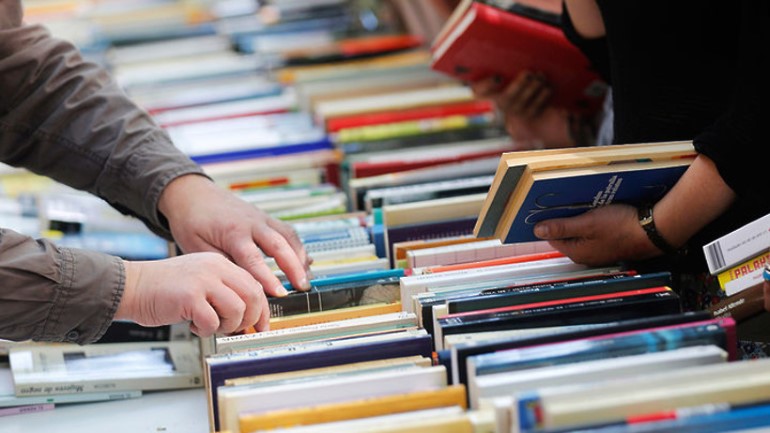Russian book industry has suffered from the economic crisis the most - overall book pressrun decreased by 40%. But here's what is interesting - the decrease is predominantly connected with fiction, but the pressrun of scientific, children's books and textbooks almost did not suffer. We studied what it is connected with at a round-table discussion with representatives of the Russian book industry.
Literary secretary of the "Russian Booker" Prize Igor Shaitanov took two books to the meeting. The first one was named "Russian Booker - 25". "It is the history of Russian novel for 25 years", - said Igor Shaitanov and mentioned that 25 years for an independent prize is quite an age. The second book was a poetic collection by Oleg Chukhontsev with a curious name for a Russian ear "From & Beyond". Igor Shaitanov is sure that the level of the Russian poetry can be measured by this name.
Chairman of the Expert Board of "Big Вook" Prize Mikhail Butov in turn mentioned a new surge of interest to this prize from the literature society, which tended to fall. A reason for such a surge was a scandal, as usual. "Big Book's shortlist drove some people mental and some other were content with it", - Butov commented. The madness was first of all connected with "Dragon Songs" book by zoologist Vladimir Dinets, who described his travel connected with crocodile studies. A part of the expert Board thought such a non-fiction book cannot be nominated for such a respected prize.
However, Igor Shaitanov mentioned that such an acute reaction is good for literature, as it attracts attention to it and has an effect on the nominees' books pressruns, increasing them for 15–20 thousand copies, which is quite significant as such. Still, the events and scandals of the book market are not too much connected with our awards - none of the award winners has become an author of a bestseller, so far. Top-selling authors Dontsova, Aleksandrova and Ustinova are still keeping their heads above water, but they will never receive "Russian Booker" or "Big Book" for sure.
However, economic crisis also affected these book industry behemoths - their pressruns fell from 9 to 2 million issues. Recent years have brought no success to book industry in general, said member of the Book Publishers Association Sergei Dmitriev. In 2008, overall pressrun of all the published books was 760 million issues; in 2015 it was only 460 million. The decrease amounts to 40%, which is much more, than in any other sphere.
Today, 75 percent of book market is educational literature. Books tend to educate more and entertain less./Sergei Dmitriev, "Veche" Publishing House
But here's what is interesting - the decrease is predominantly connected with fiction (for instance, previously super popular Akunin is now published 4-5 times less), but the pressrun of children's books and text books has not almost suffered, scientific books have been almost unaffected. "Today, 75 percent of book market is educational literature. Books tend to educate more and entertain less", - said Sergei Dmitriev.
At the same time, experts are sure that the number of readers have stayed the same - it is just easier for them to download a book from the Internet, than to buy it. In turn, it is much more profitable for the book sellers to “deliver a truckload of dontsovas, than 50 copies of “Booker’s” winners", - said Igor Shaitanov. It would be wrong to accuse book shops of such selectivity – they have to compete with other shops, including grocery stores. Many of them fail to compete – only this year, 25 book stores were closed in Moscow.
It is a vicious circle: prices for books rise and purchasing power is getting lower. The state could help here by cancelling VAT for books. “We have a strange situation in our country – Hollywood films are not taxed, but books are”, - noticed Sergei Dmitriev. Without VAT, a book price would decrease by 15–20%. According to him, the help of the state is also required by libraries that almost do not buy new books, as they are not given money for this.
So, it is much easier for publishers to sell classic works, than to promote new names. Sergei Dmitriev, who is also the Head of “Veche” Publishing House, told than they have recently printed “Don Quixote”, “Eugene Onegin” and “Crime and Punishment”- all with regard to the current reader demand.
By the way, according to him, such a reader’s demand has recently emerged for almost forgotten Soviet works like “Eternal Call” by Anatoliy Ivanov, “Strogovs” by Georgiy Makarov. Such epic genre is in demand in province.








